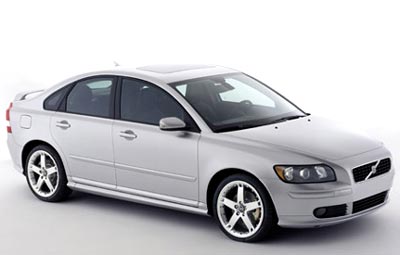
Joel A over at the Ford Blog makes a good point in a recent post. A lot of people, myself included make simplifications about platform sharing and the cars involved. In the case of the Mazda3 and Volvo S40, platform-mates on the C1 platform that includes the European Ford Focus, he points out they are really completely different cars, directed at seperate buyers.
 While it's true that these cars (Ford/Mazda/Volvo) share the same platform, it's not true that they are the same. In the case of the Volvos we're talking about not only completely unique bodywork, but drivetrains. While Mazda and Ford share basic powerplants in the 2.0/2.3 I-4 the Volvos use I5s only shared with Ford's European Focus ST. Even the Ford and Mazda powertrains are differentiated, with the Mazda utilizing Variable Valve Timing and achieving 10 hp more.
While it's true that these cars (Ford/Mazda/Volvo) share the same platform, it's not true that they are the same. In the case of the Volvos we're talking about not only completely unique bodywork, but drivetrains. While Mazda and Ford share basic powerplants in the 2.0/2.3 I-4 the Volvos use I5s only shared with Ford's European Focus ST. Even the Ford and Mazda powertrains are differentiated, with the Mazda utilizing Variable Valve Timing and achieving 10 hp more.There are shared mounting points and some parts, but the brakes and suspension are not direct bolt over swaps either. The interiors are unique and if you closely examine each car you will notice many more differences than similarites.
This is not GM rebadging J Bodies, it's "platform" sharing meaning the basic structure. While I constantly refer to my 3 as the Focus I should have been able to buy, the truth would be that if a C1 Focus was on sale in the US, it would be a different car with a different feel.
The same can be said for the Fusion/Mazda6 and the VolvoS80/Ford 500, basic architecture is shared but they are unique vehicles. Good post Joel. You may recognize Joel's writing from TheCarBlog as well.
A cross-post. Kewl. Thanks, Joe.
ReplyDeleteAgain, I'm continually surprised when seasoned reviewers make the assumption that buyers will switch to the less expensive vehicle once they realize the platform's the same. That may have happened in the era of badge engineering (here's looking at you, GM), but not on well-executed platform engineering (e.g., Toyota and Lexus). People buy cars for many different reasons with little regard the vehicle's underpinnings. Platform engineering is a fast and inexpensive means to fulfill those reasons.